Introduction to Email Marketing for Ecommerce
Establishing a robust connection with your audience is pivotal. Enter email marketing, a powerful tool that can elevate your ecommerce game to unprecedented heights. This article aims to explain the significance of email marketing for ecommerce, shedding light on its pivotal role in driving sales and fostering customer engagement.
Table of Contents
Why Email Marketing for Ecommerce Matters:
Picture this: a visitor stumbles upon your online store, browses through your products, but leaves without making a purchase. What if you could bring them back for a second look, or even better, convert their interest into a sale? This is precisely where email marketing steps in.
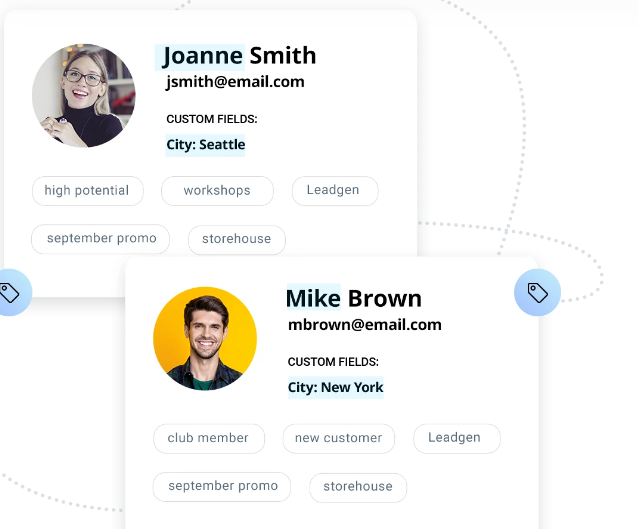
Unlocking Customer Engagement:
email marketing for ecommerce allows you to maintain an ongoing conversation with your audience. Through personalized and targeted campaigns, you can share product updates, promotions, and relevant content directly with your customers. It’s like having a direct line to their inbox, making it an invaluable tool for building lasting relationships.
Driving Sales and Conversions:
Ecommerce is not just about attracting visitors; it’s about converting them into paying customers. Email marketing enables you to guide potential buyers through the sales funnel. From abandoned cart reminders to exclusive discounts, strategically timed emails can be the nudge needed to turn a casual browser into a loyal customer.
1. Key Components of Successful Email Marketing for Ecommerce:
Segmentation:
One size does not fit all, especially in ecommerce. Email marketing tools allow you to segment your audience based on various criteria such as purchase history, preferences, and engagement levels. This targeted approach ensures that your messages resonate with specific groups, increasing the likelihood of conversion.
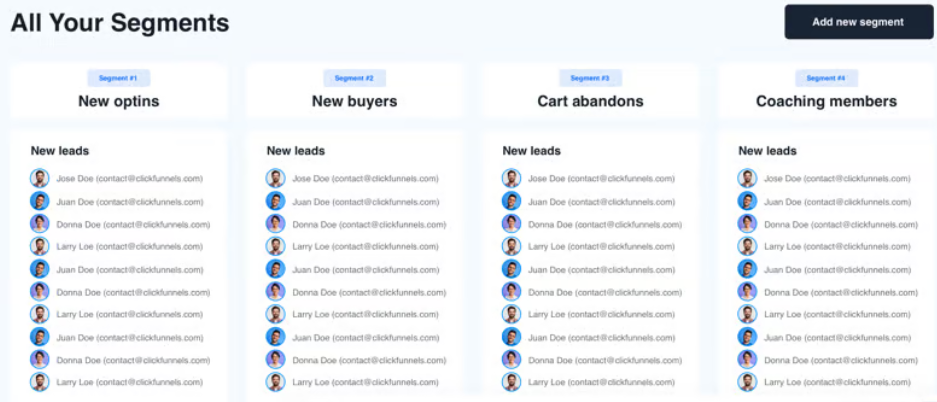
Automation:
Imagine being able to send personalized emails without manually clicking “send” every time. Email marketing tools offer automation features that enable you to schedule and trigger emails based on customer actions. This not only saves time but also ensures that your messages are timely and relevant.
Personalization:
Customers appreciate a personal touch. Email marketing for ecommerce lets you tailor your messages, addressing recipients by their names and recommending products based on their past purchases. This level of personalization enhances the customer experience and fosters a sense of connection.
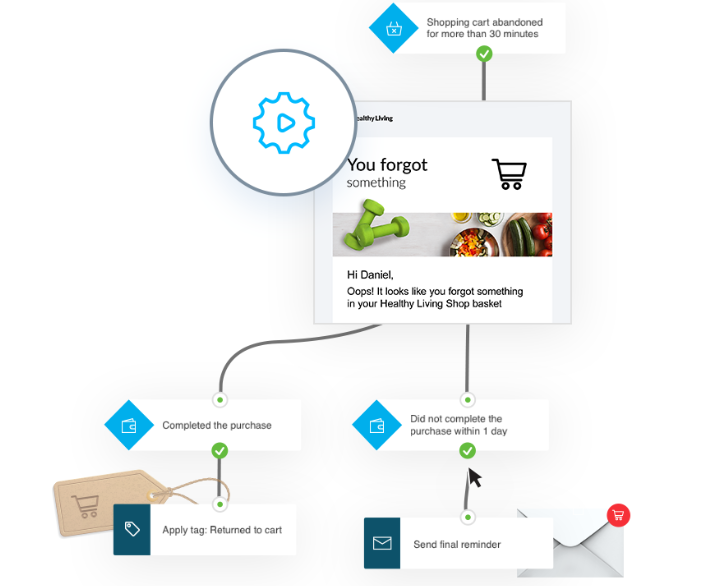
Analytics and Reporting:
Data is the backbone of effective email marketing. Analytics tools integrated into these platforms provide insights into the performance of your campaigns. From open rates to click-through rates, these metrics empower you to refine your strategy, ensuring continuous improvement.
By grasping the essence of email marketing for ecommerce, you’re setting the stage for harnessing the full potential of this powerful tool. Stay tuned as we dig deeper into specific email marketing tools tailored for ecommerce success.
2. Product Spotlight: GetResponse for Email Marketing for Ecommerce
In the bustling world of email marketing, one platform that stands out for ecommerce businesses is GetResponse. This versatile tool offers a suite of features tailored to enhance your email campaigns and drive results. Let’s explore why GetResponse is a noteworthy choice for email marketing in the ecommerce realm.
User-Friendly Interface:
GetResponse boasts a user-friendly interface, making it accessible even for those new to email marketing. With a simple drag-and-drop editor, creating visually appealing emails is a breeze. This is a significant advantage for ecommerce businesses looking to craft engaging product showcases and promotions without the need for coding skills.
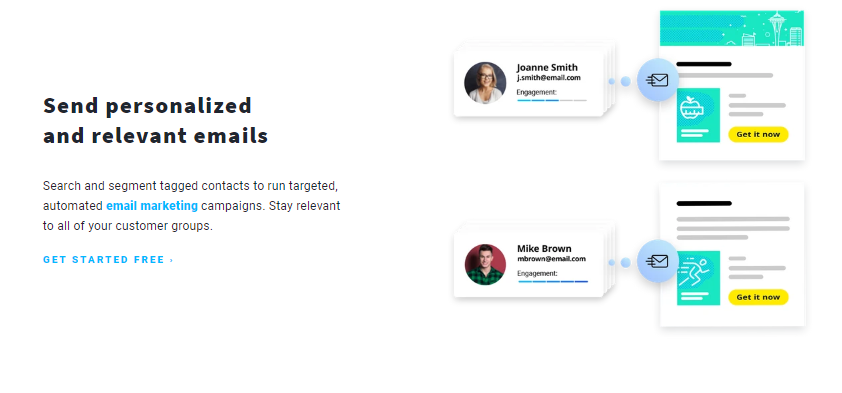
Ecommerce-Specific Templates:
GetResponse understands the unique needs of ecommerce businesses. The platform offers a range of professionally designed templates specifically crafted for online stores. These templates are optimized for showcasing products, promoting sales, and driving conversions, ensuring your emails have a polished and effective appearance.
Advanced Segmentation Capabilities:
GetResponse excels in audience segmentation. The platform allows you to categorize your subscribers based on various factors, such as purchase history, location, and engagement levels. This granular segmentation enables you to send highly targeted and relevant emails, increasing the chances of customer engagement and conversions.
Automation Workflows:
Automation is a game-changer in email marketing, and GetResponse delivers on this front. The platform enables you to set up intricate automation workflows based on customer actions. Whether it’s sending a series of onboarding emails for new subscribers or re-engagement emails for inactive customers, GetResponse automates the process, saving you time and ensuring timely communication.
Robust Analytics and Reporting:
GetResponse provides comprehensive analytics to track the performance of your email campaigns. From open rates to click-through rates, the platform offers insights that help you gauge the effectiveness of your efforts. This data-driven approach empowers you to refine your strategy for better results.
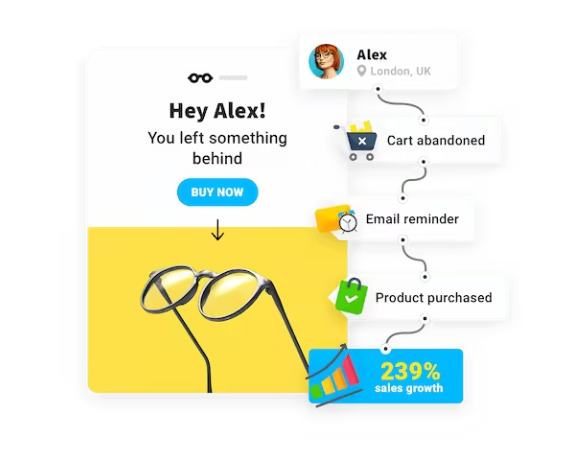
As you embark on your journey for email marketing for ecommerce, consider GetResponse as a powerful ally. Its user-friendly interface, ecommerce-centric templates, advanced segmentation, automation capabilities, and robust analytics make it a valuable tool for businesses looking to maximize the impact of their email campaigns. Stay tuned for more insights into email marketing tools tailored for ecommerce success.
Try us free | No credit card required | Cancel anytime
3. Product Spotlight: ClickFunnels for Email Marketing for Ecommerce
In the field of email marketing for ecommerce, ClickFunnels emerges as a dynamic platform designed to streamline the customer journey and boost conversions. Let’s explore why ClickFunnels is a noteworthy choice for ecommerce businesses seeking an all-in-one solution for their email marketing needs.
Intuitive Sales Funnel Creation:
At the core of ClickFunnels is its intuitive sales funnel builder. This feature allows even beginners to design and customize sales funnels effortlessly. Whether you’re aiming to capture leads, sell products, or promote special offers, ClickFunnels simplifies the process, ensuring a smooth and effective customer journey.
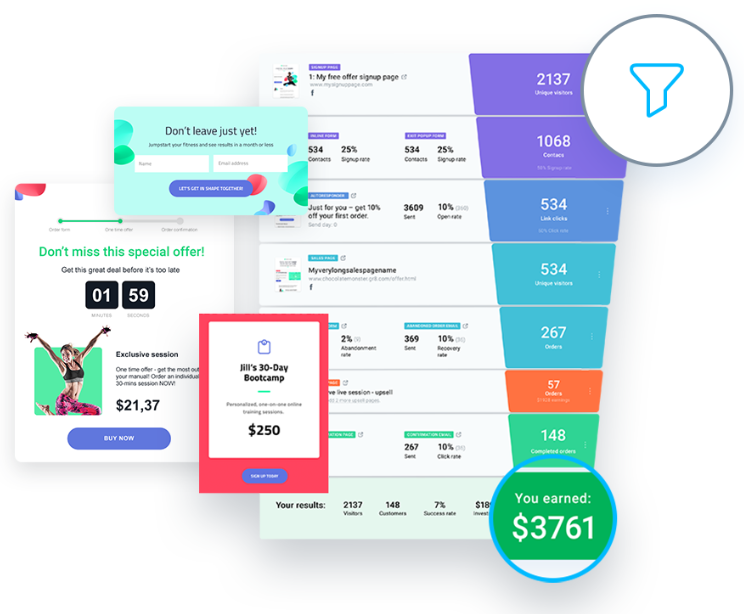
Seamless Email Integration:
ClickFunnels seamlessly integrates with various email marketing for ecommerce, providing a cohesive experience for users. This integration ensures that your email campaigns are seamlessly woven into your sales funnels. From capturing leads to sending targeted follow-up emails, ClickFunnels enhances your email marketing strategy within a unified environment.
Conversion-Optimized Templates:
ClickFunnels offers a collection of conversion-optimized templates, specifically designed to drive results. These templates cover every stage of the sales funnel, including landing pages and email layouts. With visually appealing and strategically crafted designs, ClickFunnels empowers ecommerce businesses to create high-converting campaigns without the need for design expertise.
Actionable Analytics and Split Testing:
Understanding your audience’s behavior is crucial for optimizing campaigns. ClickFunnels provides actionable analytics and split testing features, allowing you to track the performance of your sales funnels and email campaigns. By analyzing data on user interactions, you can make informed decisions to enhance your strategy for better results.
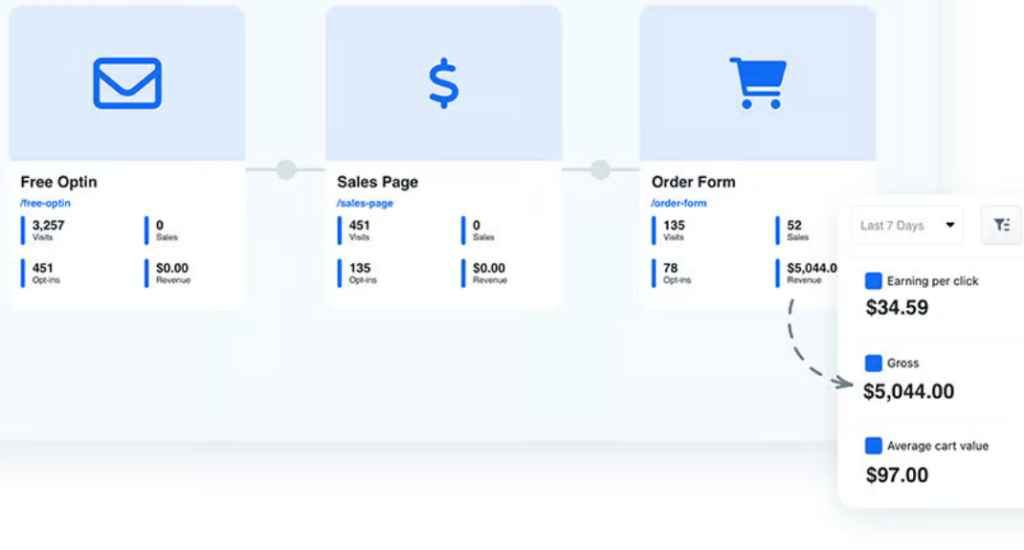
Automated Follow-Up Sequences:
ClickFunnels empowers email marketing for ecommerce businesses with automated follow-up sequences. Whether it’s sending a series of emails after a purchase or re-engaging with potential customers who abandoned their carts, ClickFunnels automates the follow-up process. This ensures that your email communication is timely, personalized, and optimized for maximum impact.
As you explore options for email marketing in ecommerce, ClickFunnels stands out as a comprehensive solution. With its intuitive sales funnel builder, seamless email integration, conversion-optimized templates, actionable analytics, and automated follow-up sequences, ClickFunnels provides a robust platform for businesses aiming to elevate their email marketing efforts. Stay tuned for more insights into email marketing tools tailored for ecommerce success.
Get Started In Less Than 60 Seconds • Cancel Anytime
4. Comparison of Pricing Models in Email Marketing for Ecommerce
When it comes to selecting the right email marketing for ecommerce business, understanding the pricing models is crucial. Let’s dive into a comparison of the common pricing structures employed by these platforms to help you make an informed decision.
**1. Pay-Per-Subscriber:
This traditional model charges you based on the number of subscribers in your email list. As your audience grows, so does the cost. It’s a straightforward approach suitable for businesses with a stable and predictable subscriber base.
2. Pay-Per-Email-Send:
In this model, you pay for each email you send. It’s a flexible option for businesses with fluctuating email volumes. However, costs can escalate as your campaigns become more frequent or extensive.
3. Tiered Pricing Plans:
Many email marketing platforms offer tiered pricing, where the cost is structured based on the size of your subscriber list or the volume of emails sent. As you move up the tiers, you gain access to more advanced features and increased sending limits.
4. Freemium or Free Trial:
Some platforms offer a freemium model or a free trial period. This allows you to use a limited version of the platform for free or try out all features for a set duration before committing to a paid plan.
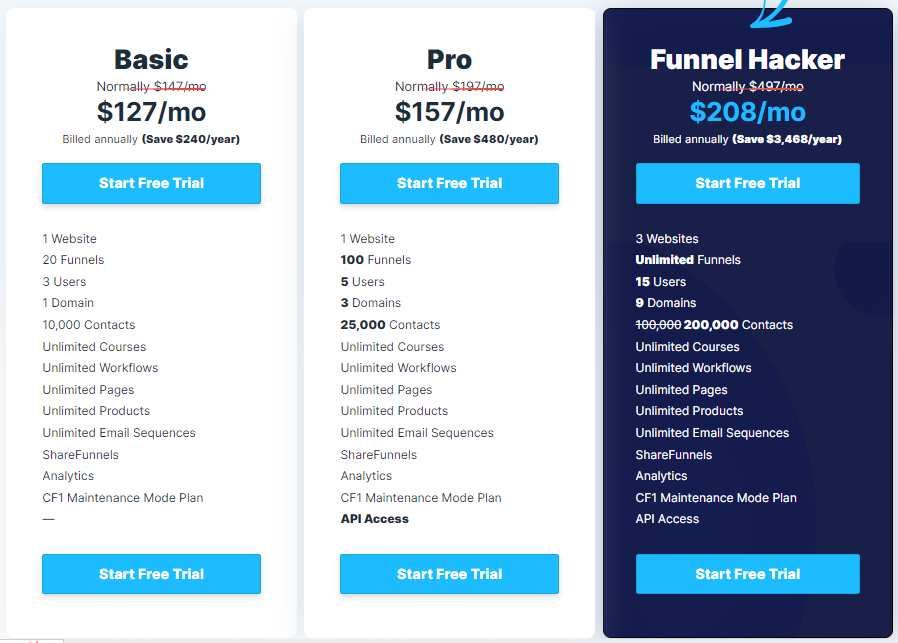
Considerations for Ecommerce Businesses:
- Scalability: Assess how well the pricing model scales with your business growth. Ensure that the chosen plan can accommodate your expanding subscriber list and increased email volume without causing a significant spike in costs.
- Features vs. Cost: Evaluate the features offered at each pricing tier. Consider whether the features align with your ecommerce needs and if the investment is justified by the value provided.
- Trial Periods: Take advantage of free trials or freemium options to test the platform’s suitability for your business. This hands-on experience will give you insights into the platform’s user-friendliness and its compatibility with your workflow.
- Hidden Costs: Be mindful of any hidden costs, such as additional fees for exceeding subscriber limits or surpassing email sending quotas. A transparent pricing structure is essential for budget planning.
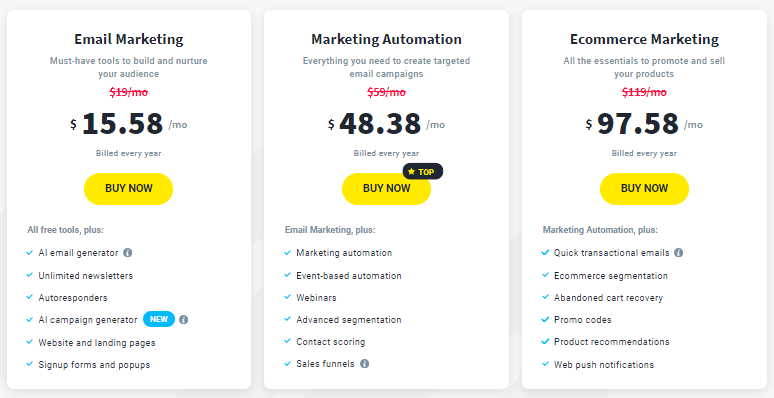
By understanding the nuances of different pricing models, you can choose an email marketing platform that aligns with your ecommerce goals and budget constraints. Keep these considerations in mind as you navigate the pricing landscape to find the optimal solution for your business. Stay tuned for more insights into maximizing email marketing for ecommerce success.
5. Case Studies: Success Stories in Email Marketing for Ecommerce
Real-world success stories serve as powerful testimonials for the effectiveness of email marketing in the ecommerce realm. Let’s explore a couple of case studies that highlight how businesses leveraged email campaigns to achieve remarkable results.
1. [Ecommerce Business A]: Driving Sales Through Targeted Campaigns
Challenge: Ecommerce Business A faced a challenge in converting website visitors into actual customers. Despite having a steady flow of traffic, the conversion rate needed improvement.
Solution: The business implemented a targeted email marketing campaign using segmentation based on customer preferences and behavior. They sent personalized product recommendations, exclusive discounts, and abandoned cart reminders.
Results: The targeted email campaign led to a significant increase in conversions. The personalized approach resulted in a higher click-through rate, and the strategically timed abandoned cart reminders recovered a notable percentage of potential lost sales.
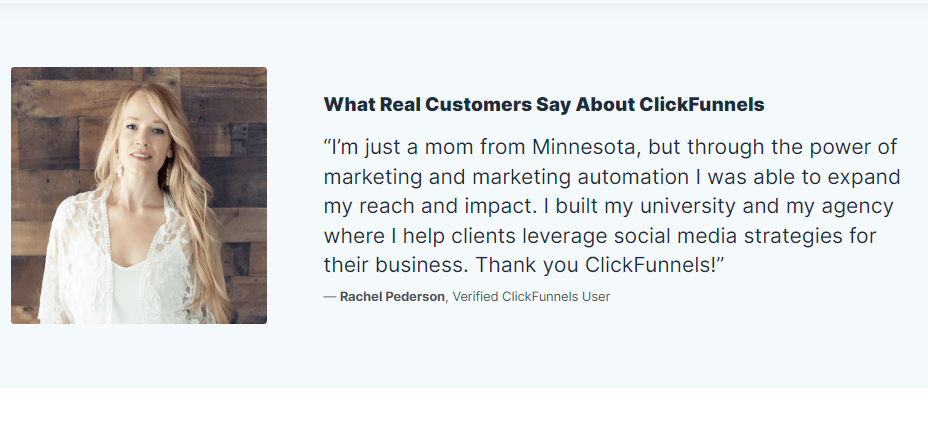
2. [Ecommerce Business B]: Building Customer Loyalty Through Email Engagement
Challenge: Ecommerce Business B struggled with customer retention. They sought a solution to keep existing customers engaged and encourage repeat purchases.
Solution: The business implemented a comprehensive email marketing strategy that included regular newsletters, exclusive loyalty offers, and post-purchase follow-up emails. They also utilized segmentation to tailor content based on each customer’s purchase history.
Results: The email engagement strategy significantly improved customer retention. The personalized newsletters fostered a sense of community, and the exclusive loyalty offers incentivized repeat purchases. As a result, the business witnessed a notable increase in customer lifetime value.
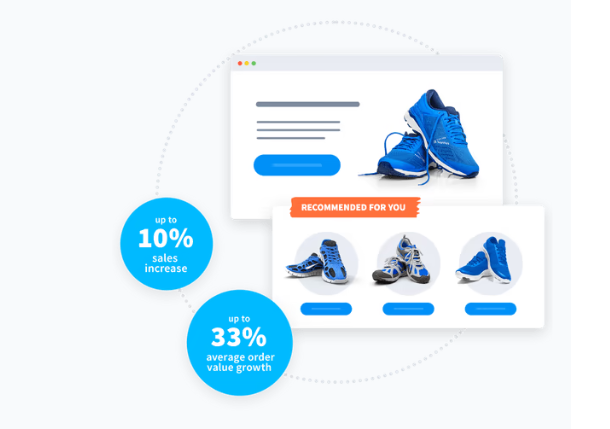
Key Takeaways from Case Studies:
- Personalization Pays Off: Both businesses achieved success by tailoring their emails to individual customer preferences. Personalized recommendations and exclusive offers contributed to higher engagement and conversions.
- Timely Communication Matters: Strategic timing, such as sending abandoned cart reminders or post-purchase follow-ups, played a crucial role in recovering potential lost sales and nurturing customer relationships.
- Consistent Engagement Builds Loyalty: Regular communication through newsletters and exclusive offers helped businesses build a loyal customer base. Consistency in engagement contributed to increased customer lifetime value.
By delving into these case studies, it becomes evident that a well-crafted email marketing strategy can yield substantial results for ecommerce businesses. Consider these success stories as inspiration for optimizing your own email campaigns to drive sales, enhance customer loyalty, and achieve lasting success.
Stay tuned for more insights into maximizing the potential of email marketing for your ecommerce endeavors.
6. Integration Capabilities: Streamlining Email Marketing for Ecommerce
Seamless integration between your email marketing for ecommerce and other tools is a game-changer. Let’s explore why integration capabilities are a crucial aspect of successful email marketing campaigns for ecommerce businesses.
1. Ecommerce Platform Integration:
Why it Matters: Many email marketing platforms offer integration with popular ecommerce platforms such as Shopify, WooCommerce, and Magento. This integration ensures that your email campaigns seamlessly align with your online store. You can effortlessly sync product information, customer data, and purchase history.
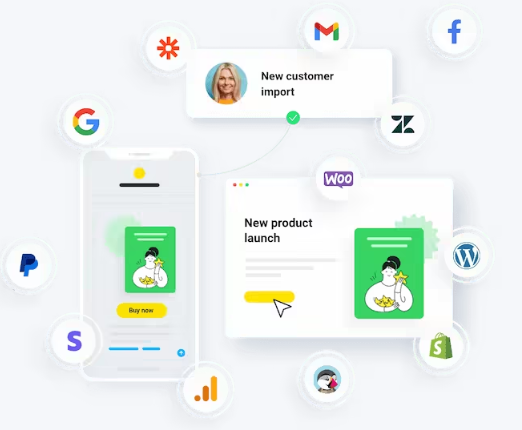
2. Customer Relationship Management (CRM) Integration:
Why it Matters: Integrating your email marketing for ecommerce with a CRM system enhances your ability to understand and engage with your customers. This integration allows for a unified view of customer interactions, enabling personalized and targeted email campaigns based on comprehensive customer profiles.
3. Social Media Integration:
Why it Matters: Linking your email marketing efforts with social media platforms amplifies your reach. Integration allows you to cross-promote your content, share user-generated content, and encourage social sharing directly from your emails. This interconnected approach strengthens brand visibility and engagement.

4. Analytics and Reporting Integration:
Why it Matters: Integrating your email marketing for ecommerce with analytics tools provides a consolidated view of your campaign performance. This integration allows for in-depth analysis, helping you make data-driven decisions to optimize your strategies and achieve better results.
5. Ecommerce Tool Integration:
Why it Matters: Beyond the core ecommerce platform, integration with other tools such as inventory management or customer support systems enhances overall efficiency. For example, automatic updates of product availability in your emails or personalized customer support based on email interactions.
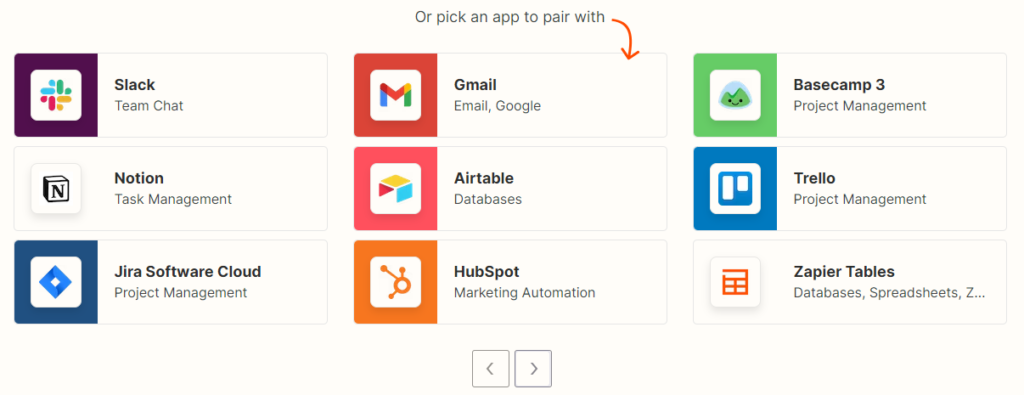
Key Takeaways:
- Efficiency and Accuracy: Integration reduces manual efforts and minimizes errors by automating data flow between different systems.
- Holistic Customer Insights: Integrated systems provide a 360-degree view of customer behavior, enabling more targeted and personalized email campaigns.
- Optimized Workflows: The interconnectedness of tools streamlines workflows, ensuring that your email marketing efforts align seamlessly with other aspects of your ecommerce business.
As you explore email marketing platforms for your ecommerce business, prioritize those with robust integration capabilities. The ability to seamlessly connect your email marketing efforts with your ecommerce platform, CRM, social media, and analytics tools is pivotal for a cohesive and effective marketing strategy.
Stay tuned for more insights into maximizing the potential of email marketing for ecommerce endeavors.
7. Best Practices for Successful Email Marketing in Ecommerce
Navigating the world of email marketing for your ecommerce business requires a strategic approach. Let’s delve into some best practices that will help you harness the full potential of your email campaigns and drive success.
1. Build a Quality Email List:
Why it Matters: A solid foundation starts with a quality email list. Ensure that your subscribers have opted in and are genuinely interested in your products or content. Quality over quantity is the key.
2. Craft Compelling Subject Lines:
Why it Matters: Your subject line is the gateway to your email. Make it irresistible. Craft subject lines that are concise, intriguing, and relevant. This increases the chances of your emails being opened.
3. Personalize Your Emails:
Why it Matters: Personalization is not just a buzzword; it’s a powerful tool. Address your recipients by their name, recommend products based on their preferences, and tailor content to their behavior. This creates a more intimate connection.
4. Design Mobile-Friendly Emails:
Why it Matters: In the age of smartphones, a significant portion of your audience will view emails on mobile devices. Ensure your emails are optimized for mobile viewing, with responsive designs and easy navigation.
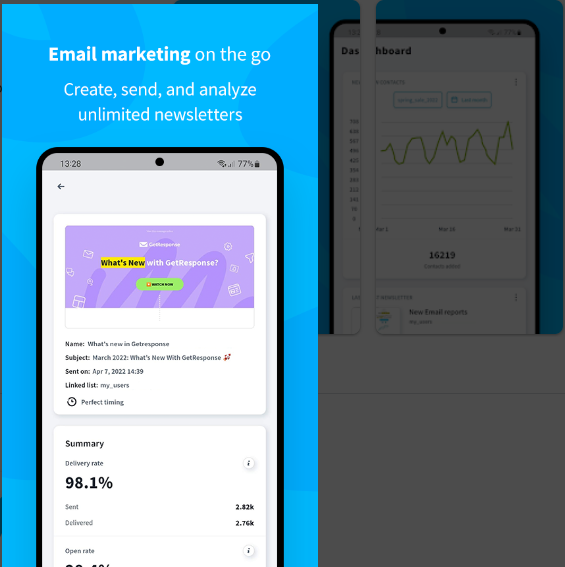
5. Implement Clear Call-to-Actions (CTAs):
Why it Matters: Guide your recipients on what to do next. Whether it’s making a purchase, clicking a link, or sharing on social media, your CTAs should be clear and compelling.
Image Opportunity: Create visuals showcasing examples of effective CTAs, highlighting their placement and design within an email.
6. Test and Optimize:
Why it Matters: Don’t rely on assumptions. A/B testing allows you to experiment with different elements of your emails (subject lines, images, CTAs) and analyze what resonates best with your audience.
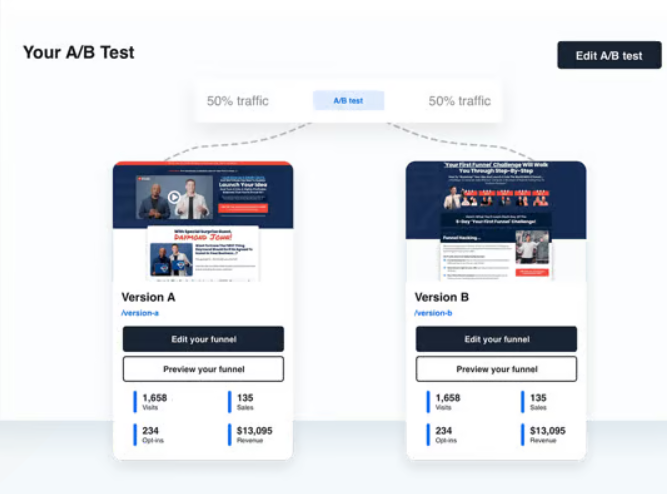
7. Leverage Automation for Efficiency:
Why it Matters: Automation simplifies your workload and ensures timely communication. Set up automated workflows for welcome emails, abandoned cart reminders, and post-purchase follow-ups.
8. Monitor and Analyze Performance:
Why it Matters: Regularly monitor the performance of your email campaigns. Analyze metrics such as open rates, click-through rates, and conversion rates. Use this data to refine your strategies and optimize future campaigns.
By incorporating these best practices into your email marketing strategy, you’ll be well on your way to creating impactful campaigns that resonate with your audience, drive engagement, and boost sales. Stay tuned for more insights into maximizing the potential of email marketing for your ecommerce endeavors.
Conclusion: Email Marketing for Ecommerce
In the ever-evolving landscape of ecommerce, email marketing for ecommerce stands as a stalwart ally, capable of transforming casual browsers into loyal customers. Through this journey, we’ve explored the fundamental aspects and best practices that can propel your email marketing campaigns to new heights, ultimately driving success for your ecommerce business.
From the importance of building a quality email list to the art of crafting compelling subject lines, each step contributes to the overarching goal of creating impactful and engaging email campaigns. Personalization, mobile optimization, and clear call-to-actions emerge as the cornerstones of effective communication, fostering a connection with your audience that goes beyond the virtual realm.
The integration capabilities we’ve discussed open doors to streamlined workflows, ensuring that your email marketing efforts seamlessly align with other crucial elements of your ecommerce strategy. Whether it’s syncing with your ecommerce platform, harnessing CRM insights, or integrating with social media, these connections enhance efficiency and amplify your brand’s reach.
As we highlighted specific email marketing tools like GetResponse and ClickFunnels, you gained insights into how these platforms cater to the unique needs of ecommerce businesses. Understanding their features, benefits, and integration capabilities positions you to make informed decisions aligned with your business objectives.
And let’s not forget the real-world impact illustrated through case studies. These success stories underscore the transformative power of well-executed email marketing strategies, showcasing the potential for increased conversions, customer loyalty, and business growth.
In conclusion, mastering email marketing for your ecommerce venture involves a combination of strategic planning, leveraging powerful tools, and staying attuned to the evolving needs of your audience. The best practices we’ve explored are not merely guidelines but stepping stones toward creating a robust and effective email marketing strategy.
As you embark on implementing these insights into your own email campaigns, remember that the world of ecommerce is dynamic, and adaptation is key. Stay agile, monitor performance metrics diligently, and continuously optimize your strategies based on insights gained.
Elevate your ecommerce success with the mastery of email marketing – a versatile tool that not only drives sales but nurtures lasting relationships with your audience. Here’s to your continued success in the ever-expanding digital marketplace!
RELATED:


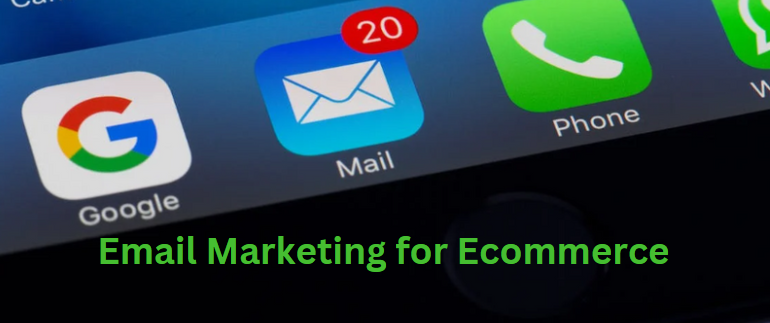

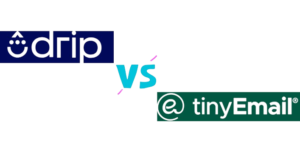

Pingback: Best Email Marketing Strategy for Small Business in 2024
Pingback: Email Marketing Automation Tools for Startups: 25 Proven Solutions for Dynamic Engagement
Pingback: Email Deployment: 9 Powerful Strategies for Effective Digital Marketing